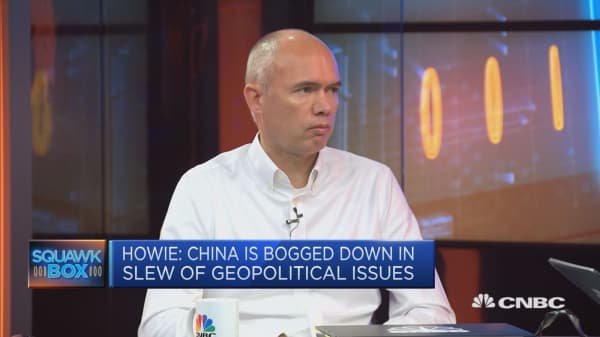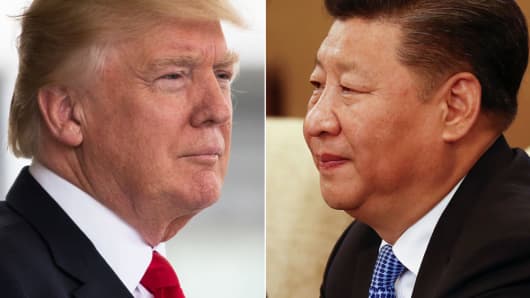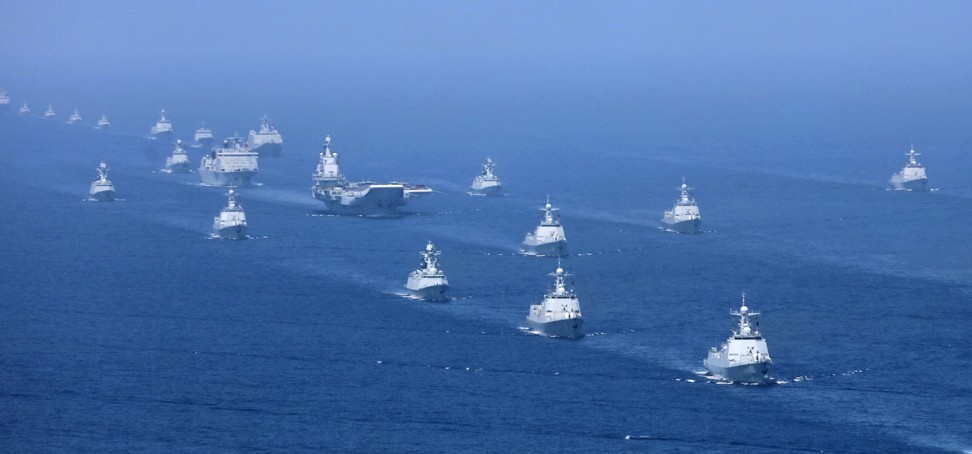
As the changing nature of the U.S.-China relationship reshapes global political and economic landscapes, many countries are wondering if they'll eventually be forced to take sides.
If it comes to that, many will choose to align themselves with America, according to Fraser Howie, an independent analyst who has written books about China and its financial system.
"They're going to go with the States," he told CNBC on Wednesday.
Although much of Asia has become wealthier on the back of China's economic rise since the start of the communist country's reforms 40 years ago, the East Asian giant has not managed to grow its soft power much, Howie told CNBC's "Street Signs."
"In 30 years of growth, much of Asia (has become) rich on the back of China, (but) they've failed to make friends. I think this is a weakness of Chinese soft power — they've failed to make friends and people are more nervous of China rather than friendly towards it," he said.
China's rise from an impoverished country to the world's second-largest economy in the span of 40 years has emboldened the Asian country to expand its footprint economically, politically and technologically.
Many see that development as a threat to the U.S. that could bring about a seismic change in the world order Washington helped shape.
"China's goal, simply put, is to replace the U.S. as the world's largest global superpower," FBI Director Christopher Wray said at a press conference in December where the U.S. Justice Department announced hacking charges against two Chinese nationals.
U.S. President Donald Trump's administration is currently locked in a bitter dispute with Beijing that has the two sides arguing over not just the tariffs and non-tariff barriers affecting the balance of trade, but also how they fundamentally treat each other's companies.

President Donald Trump and Xi Jinping.
That means businesses, as well, may have to decide on which side they choose to align themselves, the co-founder of billion-dollar tech company Tradeshift told CNBC last month.
Countries neighboring China — many of which are small — may not want to antagonize Beijing, Howie said, but many people feel they have been "hard done" by China.
"They don't feel that China has played fair in many areas. They feel China is a bully — and certainly it is — and they are using it as an opportunity to try and push back," Howie said.
Even so, many nations around the world that find themselves in a delicate balancing act between U.S. and Chinese interests may be forced to pick a side.
Meanwhile, many allies and partners of the U.S. — and even departing Secretary of Defense James Mattis — have expressed frustration that the Trump administration has not treated international commitments as well as they'd have liked.
"It makes it very difficult for many of the countries, especially in (Southeast Asia), because so many countries in Asia have largely dismissed politics as it was; there's been an economic direction of travel that everyone has been comfortable with for 20, 30 years — and that's now fundamentally changing," said Howie.
One country that has openly expressed concern is Singapore.
Singaporean Prime Minister Lee Hsien Loong told CNBC in October last year that his country's relationship with the world's top two economies also "depends on how the U.S. relationship with China develops."
"If there are tensions between America and China, we will be asked to pick a side. It may not be directly, but you will get the message that: 'We would like you to be with us, and are you with us? If not, does that mean you're against us?' And that's to put it gently," Lee said.
Countries would ideally not have to take sides, but that may not pan out, said Howie: "There should be room for cooperation and there certainly needs to be a change of practices, but the world is going to look very different in a decade."
"China's goal, simply put, is to replace the U.S. as the world's largest global superpower," FBI Director Christopher Wray said at a press conference in December where the U.S. Justice Department announced hacking charges against two Chinese nationals.
U.S. President Donald Trump's administration is currently locked in a bitter dispute with Beijing that has the two sides arguing over not just the tariffs and non-tariff barriers affecting the balance of trade, but also how they fundamentally treat each other's companies.

President Donald Trump and Xi Jinping.
That means businesses, as well, may have to decide on which side they choose to align themselves, the co-founder of billion-dollar tech company Tradeshift told CNBC last month.
Countries neighboring China — many of which are small — may not want to antagonize Beijing, Howie said, but many people feel they have been "hard done" by China.
"They don't feel that China has played fair in many areas. They feel China is a bully — and certainly it is — and they are using it as an opportunity to try and push back," Howie said.
Even so, many nations around the world that find themselves in a delicate balancing act between U.S. and Chinese interests may be forced to pick a side.
Meanwhile, many allies and partners of the U.S. — and even departing Secretary of Defense James Mattis — have expressed frustration that the Trump administration has not treated international commitments as well as they'd have liked.
"It makes it very difficult for many of the countries, especially in (Southeast Asia), because so many countries in Asia have largely dismissed politics as it was; there's been an economic direction of travel that everyone has been comfortable with for 20, 30 years — and that's now fundamentally changing," said Howie.
One country that has openly expressed concern is Singapore.
Singaporean Prime Minister Lee Hsien Loong told CNBC in October last year that his country's relationship with the world's top two economies also "depends on how the U.S. relationship with China develops."
"If there are tensions between America and China, we will be asked to pick a side. It may not be directly, but you will get the message that: 'We would like you to be with us, and are you with us? If not, does that mean you're against us?' And that's to put it gently," Lee said.
Countries would ideally not have to take sides, but that may not pan out, said Howie: "There should be room for cooperation and there certainly needs to be a change of practices, but the world is going to look very different in a decade."


